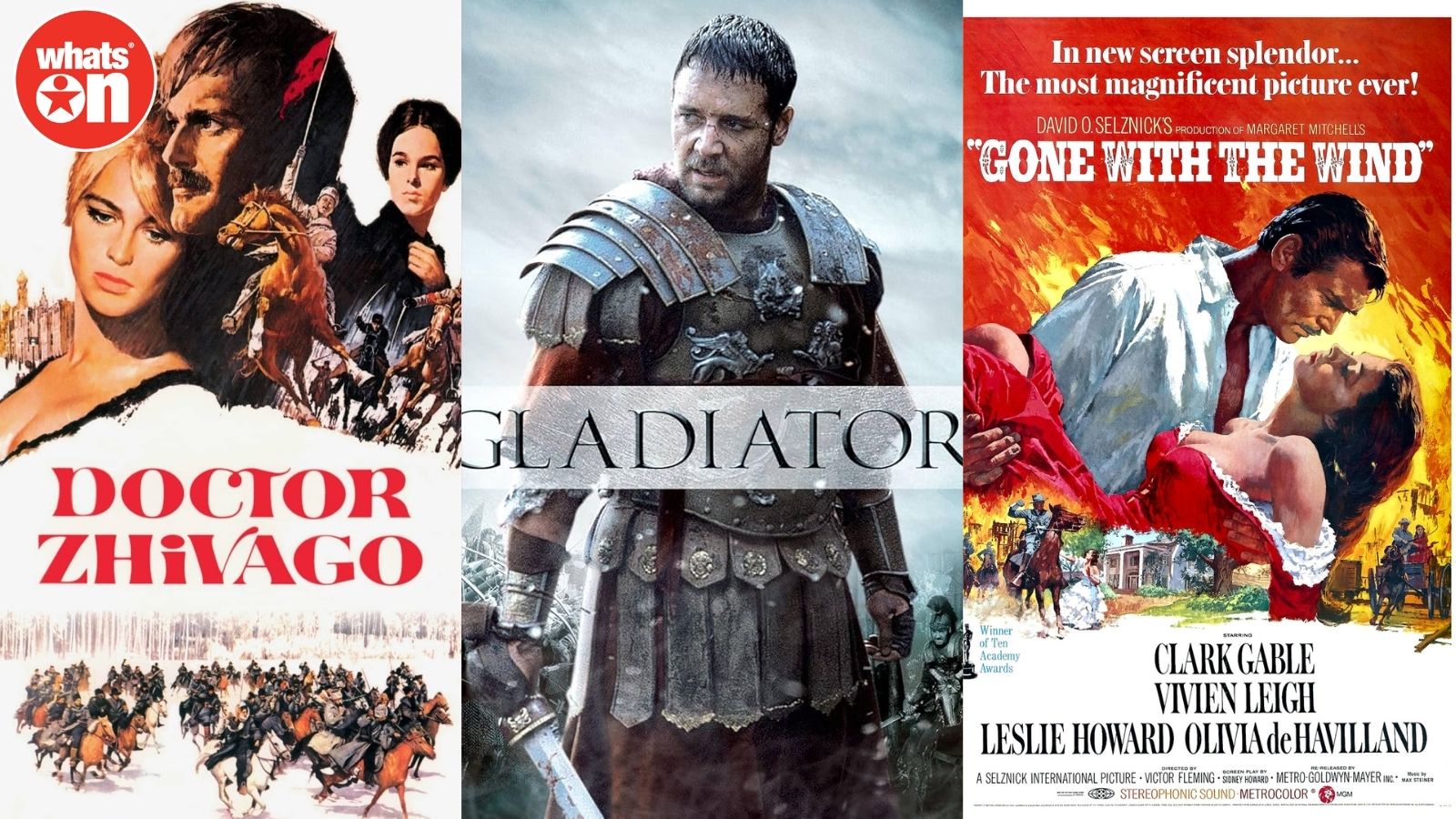Film Friday: 7 Timeless Epics That Shaped Cinema

Some films entertain. Others inspire. But epic films? They leave a legacy. These are the stories that unfold on massive scales, with grand visuals, unforgettable performances, and emotional depth that lingers long after the credits roll. Here are seven of the greatest epic films of all time—timeless masterpieces that continue to shape generations of filmmakers and movie lovers alike.
1. Ben-Hur (1959)
Director: William Wyler
Starring: Charlton Heston, Jack Hawkins, Stephen Boyd
Ben-Hur is the gold standard of epic filmmaking. Adapted from Lew Wallace’s novel, this tale of betrayal, redemption, and faith unfolds during the time of Christ. Judah Ben-Hur, a wealthy Jewish prince, is wrongfully enslaved by his childhood friend Messala, now a Roman officer. What follows is a dramatic odyssey across deserts, oceans, and the heart of the Roman Empire.
What sets Ben-Hur apart—besides its staggering 11 Academy Awards—is its iconic chariot race, still considered one of the most thrilling sequences ever captured on film. But beyond spectacle, the film’s emotional core resonates deeply, exploring themes of justice, forgiveness, and spiritual transformation.
It’s more than a movie—it’s a cinematic pilgrimage.
2. Gone With the Wind (1939)
Director: Victor Fleming
Starring: Vivien Leigh, Clark Gable, Olivia de Havilland
A sweeping romantic drama set against the backdrop of the American Civil War, Gone With the Wind is a cornerstone of Hollywood history. At its center is Scarlett O’Hara, a fiery Southern belle whose relentless spirit carries her through war, loss, and heartbreak.
The film’s lavish costumes, lush cinematography, and unforgettable performances have captivated audiences for decades. Vivien Leigh’s portrayal of Scarlett is iconic—headstrong, flawed, but fiercely human. Meanwhile, Clark Gable’s Rhett Butler remains one of cinema’s most charismatic leading men.
While the film is not without controversy for its depiction of slavery and race, its impact on the art of storytelling and film production is undeniable. Love it or critique it, you can’t ignore it.
3. Lawrence of Arabia (1962)
Director: David Lean
Starring: Peter O’Toole, Alec Guinness, Omar Sharif
Lawrence of Arabia is not just a film—it’s a visual symphony. It follows the life of T.E. Lawrence, a British officer who led Arab tribes against the Ottoman Empire during World War I. Shot largely in the Arabian desert, the film’s vast landscapes are breathtaking, and Maurice Jarre’s haunting score only heightens the majesty.
Peter O’Toole’s performance as the enigmatic Lawrence is mesmerizing—brilliant, tormented, and complex. The film explores identity, loyalty, and the price of greatness, often questioning the nature of heroism itself.
Few films use silence, space, and scenery so effectively. It’s meditative yet thrilling, historical yet personal. A true masterpiece.
4. Doctor Zhivago (1965)
Director: David Lean
Starring: Omar Sharif, Julie Christie, Rod Steiger
Another David Lean epic, Doctor Zhivago takes us through the turbulence of the Russian Revolution via a tragic love story. Yuri Zhivago, a physician and poet, is torn between his noble ideals and his romantic longings, particularly for the luminous Lara.
Set against snow-covered vistas and battle-scarred cities, the film blends personal drama with historical upheaval. Omar Sharif brings a soulful depth to the title role, and Julie Christie is luminous as Lara.
Lean once again shows his mastery of grand storytelling—turning a revolution into a backdrop for deeply human emotion. It’s heartbreaking, poetic, and visually stunning.
5. The Ten Commandments (1956)
Director: Cecil B. DeMille
Starring: Charlton Heston, Yul Brynner, Anne Baxter
This biblical epic tells the story of Moses—from his birth and adoption into Egyptian royalty to his divine mission of leading the Israelites to freedom. The Ten Commandments is Hollywood spectacle at its boldest and grandest.
Charlton Heston commands the screen with authority and grace as Moses, while Yul Brynner’s Pharaoh Rameses is equally powerful and arrogant. The parting of the Red Sea remains one of the most iconic visual effects achievements in pre-digital cinema.
Though some performances veer into melodrama, the film’s ambition, scale, and spiritual gravitas make it a cultural cornerstone. It’s a Sunday afternoon classic and a marvel of mid-century film making.
6. Spartacus (1960)
Director: Stanley Kubrick
Starring: Kirk Douglas, Laurence Olivier, Jean Simmons
Before Gladiator and 300, there was Spartacus—the original tale of a slave who dared to defy an empire. Kirk Douglas plays the titular rebel who leads a slave uprising against the Roman Republic, sparking a saga of courage, defiance, and doomed romance.
Directed by a young Stanley Kubrick (though it was producer/star Douglas who had creative control), Spartacus combines gripping battle scenes with heartfelt drama. Its screenplay, by blacklisted writer Dalton Trumbo, carries subversive undertones about freedom and resistance.
It’s not just historical drama—it’s political cinema wrapped in action and pathos. “I am Spartacus!” became a rallying cry both on and off screen.
7. Gladiator (2000)
Director: Ridley Scott
Starring: Russell Crowe, Joaquin Phoenix, Connie Nielsen
The most recent film on this list, Gladiator revived the epic genre for the 21st century. Russell Crowe stars as Maximus, a Roman general turned slave who fights his way through the arena to avenge his family and confront a corrupt emperor.
Director Ridley Scott delivers brutal action and stunning visuals, but it’s Crowe’s stoic, soulful performance that anchors the film. Joaquin Phoenix’s Commodus is deliciously despicable, a villain you love to hate.
The film’s success—winning five Oscars, including Best Picture—proved audiences still crave grand stories of honor, vengeance, and redemption. It’s as emotionally powerful as it is visually arresting.
For more Film Reviews, visit WhatsOn.guide

- Art
- Causes
- Best Offers
- Crafts
- Dance
- Drinks
- Film
- Fitness
- Food
- Games
- Festival
- Gardening
- Health
- Home
- Literature
- Music
- Networking
- Other
- Party
- Religion
- Shopping
- Sports
- Theater
- Wellness



